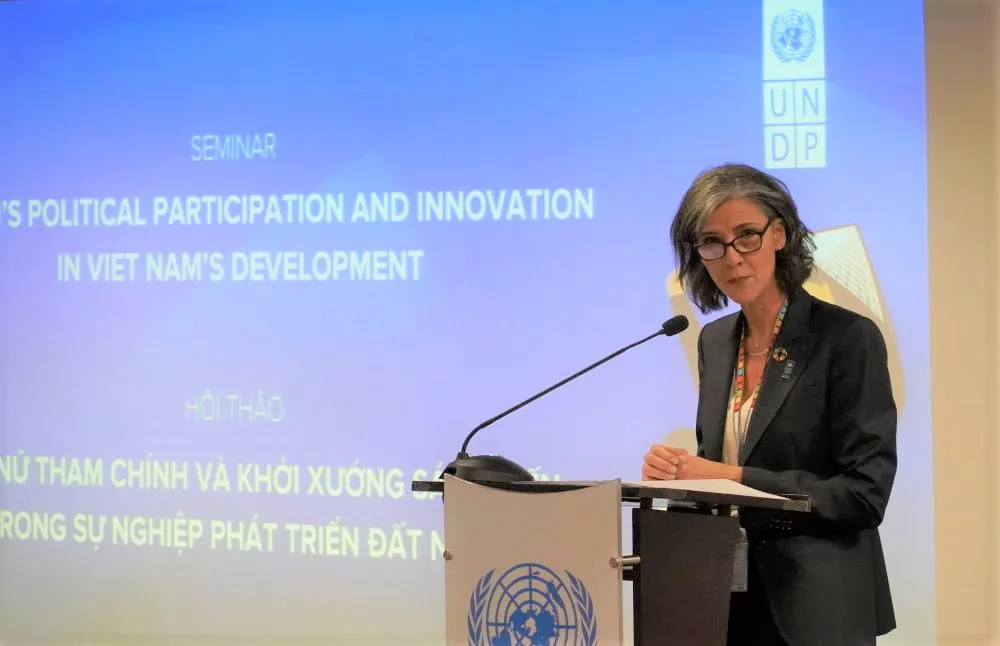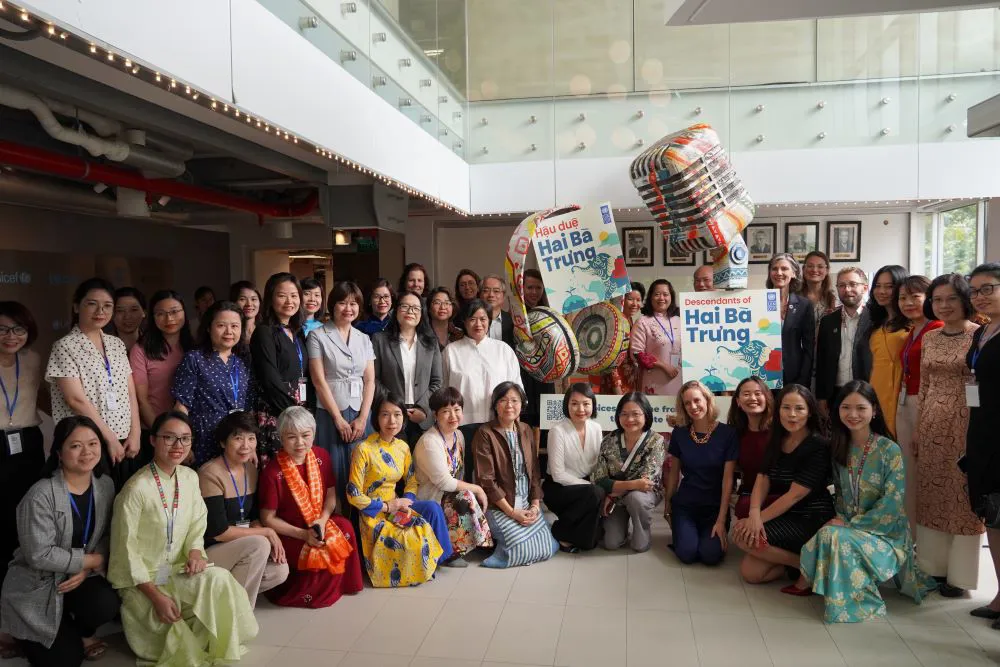Progress of women’s political participation in Vietnam
Vietnam cannot achieve millennium goals without promoting the advancement of women in society.
Vietnam has achieved commendable progress compared to other countries in the region, according to the 2022 World Economic Forum Gender Gap Report, which ranked it 83rd out of 146 countries.
The 2021 election resulted in more women deputies to the National Assembly and provincial People’s Councils.
In addition, the percentage of women in the National Assembly is now 30.26%, higher than in the previous term. Similarly, women's representation in the People’s Council Offices at all levels was also higher.
| UNDP Resident Representative Vietnam Ramla Khalidi speaks at the seminar held in Hanoi on Oct 19. Photos: UNDP |
According to United Nations Development Fund (UNDP) Resident Representative Ramla Khalidi, when it comes to women in political decision-making, Vietnam has in place an adequate legal framework to ensure gender equality in political and public life.
She said women are increasingly seen as active agents of change- the dynamic promoters of social transformations that can alter the lives of everyone.
For that reason, UNDP’s approach is about empowering women as positive change agents in an inclusive public sphere by promoting their equal participation and representation at all levels, she said when sharing UNDP's approach to support Vietnam achieve its ambitious targets.
“Besides tackling structural inequalities, we consider women as strategic partners whose active participation and ability in planning, design, and implementation are essential to all of UNDP’s programming,” Khalidi said at a seminar held in Hanoi on October 19.
At the event, joined by the National Assembly deputies and representatives from government agencies, academia, civil society, and development partners, participants agreed with the journey of women’s political participation and women-led innovations for Vietnam’s development.
Vietnam has only three more years to reach its target of 60% of the state agencies and local governments having key female leaders by 2025, and only seven more years, to achieve 75% of the state agencies and local governments with vital female leaders and 35% women’s representation in the National Assembly by 2030.
The participants discussed to understand better the underlying causes of women’s under-representation in politics. They also shared ideas about new initiatives to address the existing gender gap and identify a clear roadmap to achieve all national targets.
Notably, they highlighted efforts to tackle deeply rooted social norms and beliefs against women leaders and ways to strengthen leadership capacities that are key to promoting future female leadership.
However, women are not well represented in executive offices or higher echelons of power. The decreased number of women’s representation in the 13th Party Congress and the Politburo has shown that progress towards targets is not steady.
In addition, women’s participation at the local level faces even more significant challenges. According to UNDP Provincial Governance and Public Administration Performance Index (PAPI) findings over the last two years, women are under-represented at the local level, particularly in village leadership positions.
In 2019, only 101 out of 812 villages surveyed, accounting for 12%, had female leaders. The evidence from PAPI also strongly suggests that the additional bias against women holding village leadership positions is higher in rural areas than in urban areas.
| Participants at the event that launches UNDP's first-ever podcast, 'Descendants of Hai Ba Trung'. |
In anticipation of Vietnamese Women’s Day this year (October 20), UNDP launched its first-ever podcast, ‘Descendants of Hai Ba Trung’, featuring voices from the frontline of the climate crisis.
Carefully curated, each episode showcases the journey of women from all backgrounds sharing their experiences in mobilizing their communities and taking action in agriculture, disaster risk reduction, and circular economy to adapt and mitigate climate change.
The podcast is expected to inspire women and ensure that women’s voices are not ‘left behind’ but heard at all levels.
On the occasion of Vietnamese Women’s Day, a hybrid conference on promoting gender equality and promoting the role of women in socio-economic development was held on Oct 15 with the attendance of Prime Minister Pham Minh Chinh, who called for joint efforts to solve and share responsibility in realizing the goals of gender equality and for the advancement of women.
In response to Vietnamese Women’s Day, a number of activities have been held in Hanoi, including the “Women Startup Movement”, “Talented and elegant Businesswomen”, and Ao dai performances. The Hanoi Women’s Union has launched different programs to promote the role of women in society, including building a happy family designed to align with the city’s socio-economic development for 2021-2026.
|










